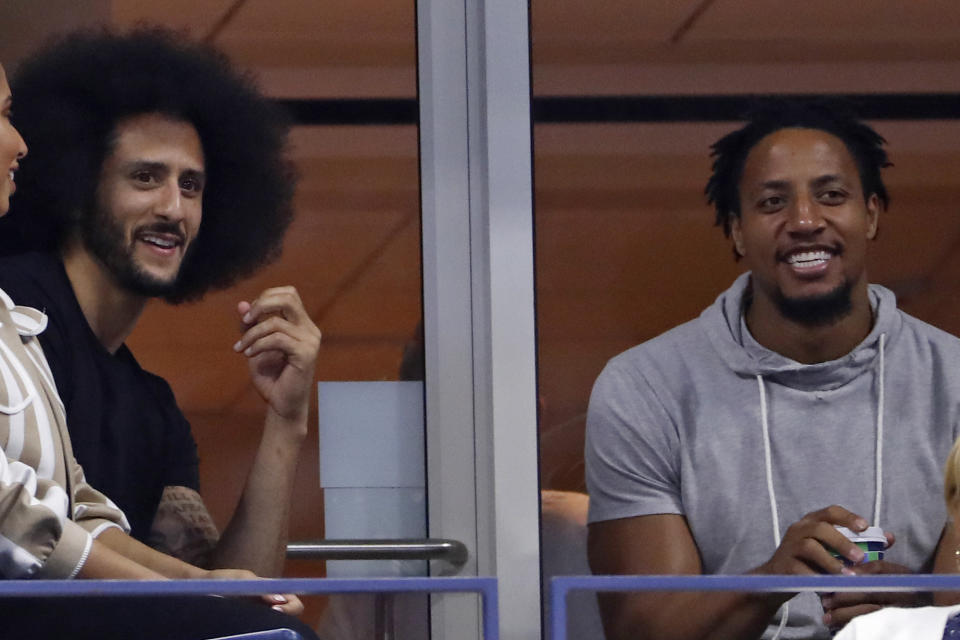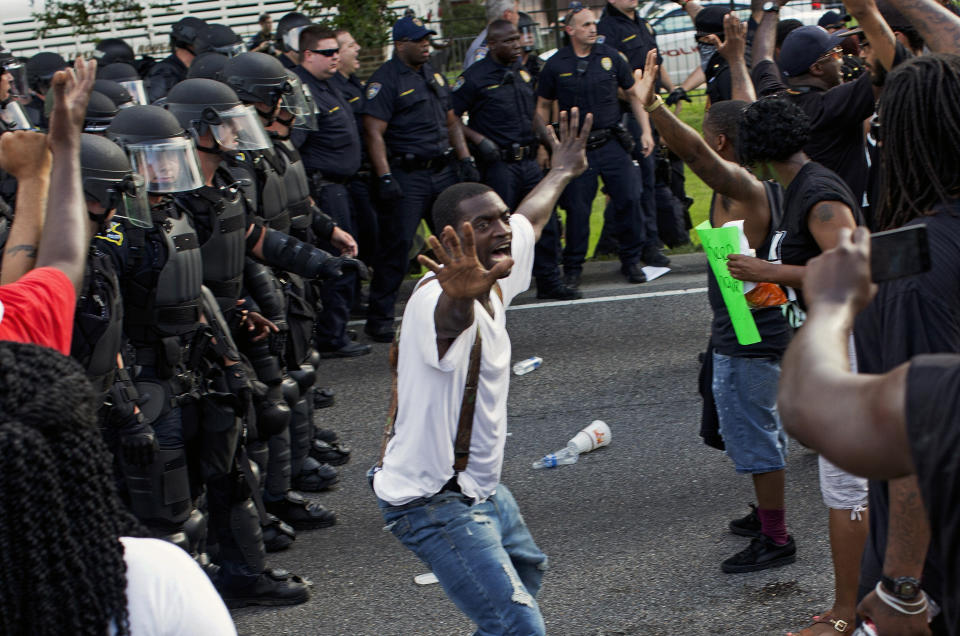Why Eric Reid knelt, and why his protest is 'not gonna be shut down'
The one thing Eric Reid Sr. wants to make clear is that it was never, and still isn’t, about the flag.
Not about the military, nor the anthem. His son, who in 2016 knelt to start a conversation that is still ongoing, has made the point in his own words. So have thousands of others.
Rather, the most polarizing protest in NFL history was about injustice both interpersonal and institutional; about racial profiling and police brutality; about a broken criminal justice system, and so much more.
And it still is.
Reid Jr., who first knelt during the national anthem alongside Colin Kaepernick 25 months ago, signed with the Carolina Panthers last week. He could debut for his new team Sunday in Charlotte, North Carolina. He may never drop to a knee during the anthem again. But his activism is ongoing. He’s “considering” other methods. “Evaluating the scope of our country,” as he put it at a news conference Monday.

Because, as he said, “next year will be 2019. It will mark 400 years since the first slaves touched the soil in this country. That’s 400 years of systemic oppression: slavery, Jim Crow, New Jim Crow, mass incarceration, you name it. … The New Deal set up what is known as the modern-day middle class. We didn’t have access to programs – the G.I. Bill, Social Security, home loans – none of that. This has been happening since my people have gotten here. So I just felt the need to say something about it.”
Yet all of that was true in 2013, when Reid entered the league. All of it was true in 2015. Reid wasn’t known as an activist then. A year later, he was willing to consciously risk his football career. Why?
Because as adolescence conceded to adulthood, he began to see the harrowing products of those 400 years up close. He knelt because of police brutality, but also because Alton Sterling was shot dead roughly 20 miles from the Reids’ family home. He knelt because of mistreatment from the police, but also because he was subjected to it as a sophomore at LSU.
As his father explained over the phone to Yahoo Sports on Thursday, those two episodes, contextualized by a childhood of diverse learning, galvanized an activist who isn’t going to stop being one anytime soon; whose protest, in the words of Reid Sr., is “not gonna be shut down.”
*****
“First thing you gotta understand,” Reid Sr. begins, wary of the topic’s complexity, is that “growing up as a black male in America, it’s a difficult challenge.”
Eric and his wife, Sharon, taught their four children to resist any societal assumptions of inferiority. “You are just as good as anybody else, no matter what color they are,” the parents would say. “So if you have any convictions … people not treating you right … you let us know. And you do what is necessary to correct that situation.”
“They were taught,” Reid says of his children, “to respect the law, to be respectful to adults, and to stand up for what they believe in.”
Eric Jr. saw how to do so up close. Sr. recalls an incident when Jr. was in junior high. A teacher grabbed middle-school Eric by the neck. Son informed father, and the following morning, father was confronting teacher and principal, with son present.
There were other lessons, too. Faith was a family cornerstone. Education was prioritized over athletics. Education of all kinds. “Black History Month is all year long for us,” Reid Sr. says. “Not just February.” The kids learned at their local church. They also learned on their own.
That’s why Reid Jr., in explaining his decision to protest last year, cited a bible verse and quoted Martin Luther King Jr. Reid Sr., speaking about the utility of protests over the phone, references W.E.B. DuBois’ famous work entitled “Agitation.”
Reid Jr. had the knowledge and the upbringing. All he needed was the eye-opening, action-spurring inspiration.
*****
First came the night in 2011. Reid Jr., driving back to his apartment at LSU, was stopped by a policeman after accidentally turning onto a street that had been closed off for a concert. So he turned around. Before he could reach his apartment via a different route, though, he was pulled over by two other officers on motorcycles.
“Then,” Reid told NOLA.com, “they left, and the original officer who stopped me came over and started screaming my Miranda rights in my face.”
The officer, according to Reid, proceeded to tell the sophomore that his 10-inch speakers were pumping music too loudly – never mind the concert raging nearby. Reid received a ticket. He eventually contested it, successfully.
But, his father says, he was “very emotional … that had a bearing on him, up to this day.”
*****

Reid Sr. remembers the other galvanizing date. Without hesitation. July 5, 2016. Alton Sterling, a 37-year-old black man, was pinned to the ground and shot six times by two white police offers in a Baton Rouge parking lot. Black America boiled with emotion. Protests ensued.
For the Reids, a Southeast Louisiana family, Sterling’s death hit close to home.
“It bothered him so much,” Sr. says of his son.
“I felt like it could have been any one of my family members that live in Baton Rouge,” Reid Jr. told NOLA.com. “It could have been my dad who works in Baton Rouge, and it could have been one of my brothers or sister. It brought me to tears and left me wondering what I could do to create change.”
*****
The story’s next chapter, by now, has been told. It ends with Reid and Kaepernick in a room with retired Green Beret and former NFL player Nate Boyer, the day before the 49ers’ final preseason game of 2016. The two Niners decided to kneel rather than sit, and did just that 24 hours later.
One aspect of the story that has not often been told: Reid, according to his father, was the one who suggested kneeling as the respectful form of protest.
Sr. agreed with the rationale. “Because when you pray, you’re kneeling,” he says now. “Whenever he’s on the field, somebody gets hurt, he’s kneeling, praying for that person. So he felt that was a better thing to do than sit on the bench. And Nate agreed with him. They agreed it was better to do that.”
What angers Reid Sr. is the narrative alterations, the corrupting of the message, the howls about respecting the flag. But he’s not the slightest bit surprised it was his son, of all people, who risked his career for a cause that mattered to him.
“He felt that if he doesn’t do anything, then he’s no better than anyone else,” Sr. says.
Said Jr. on Monday: “There’s always opposition when you speak on topics like I’m speaking on. But I’m a black man in America. I grew up black in America. You can’t tell me that what I’ve experienced and what I’ve seen is not true.”
– – – – – – –
Henry Bushnell is a features writer for Yahoo Sports. Have a tip? Question? Comment? Email him at henrydbushnell@gmail.com, or follow him on Twitter @HenryBushnell, and on Facebook.
More from Yahoo Sports:
• Jets RB’s vulgar celebration prompts fine, endorsement
• ‘Pitiful’ display by adults at Pee Wee football game
• Jeff Passan: After embarrassing playoffs exit, Cubs reflect
• NFL suspends Seattle’s Kendricks indefinitely


